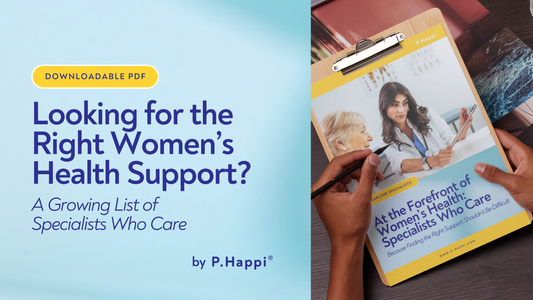
Which HRT is Right For Me?
A doctor's guide and Q&A with gynaecologist and accredited menopause specialist Dr Shilpa McQuillan
For many women, deciding whether to start hormone replacement therapy (HRT) — and if so, which type — can feel daunting. There are tablets, patches, gels, sprays, vaginal oestrogen, and different hormone combinations to consider. Add in headlines about risks and benefits, and it’s no surprise that so many women feel unsure about the best option for them.
That’s why in this Q&A, we’re speaking with Dr Shilpa McQuillan, a British Menopause Society Accredited Specialist, GP, and Community Gynaecologist, to help demystify the process. Drawing on her experience at Berkshire Menopause Clinic, she answers some of the most common questions women ask about choosing the right HRT.
Disclaimer: This article is for general information only and should not replace personalised medical advice. Please seek medical advice before making any decisions about treatment. You can also get in touch for an appointment with Dr Shilpa Mcquillan – details at the end of the article.
1. Dr Shilpa, could you start by telling us a little about yourself and what inspired you to focus your career on supporting women through menopause?
Thank you for having me. I’m Dr Shilpa McQuillan — a women’s health GP, community gynaecologist, and accredited menopause specialist. My career began in hospital gynaecology before moving into community services and general practice, where I saw how often women didn’t have the time or space to talk through their symptoms fully. Many were being treated for issues in isolation, when in fact their concerns were linked to the menopause and needed a more joined-up, personalised approach. That gap inspired me to set up the Berkshire Menopause Clinic, so women could feel listened to and receive care that looks at the whole picture.
On a personal level, I’ve experienced recurrent urinary tract infections myself, which has given me real empathy for how distressing and overlooked women’s health problems can feel. It’s reinforced my commitment to providing care that is not only evidence-based but also compassionate, helping women feel understood and supported at every stage of their journey.
2. Choosing HRT can feel overwhelming — how do you guide women in finding the type that’s right for them, and the best solution for their individual needs?
That’s absolutely right — every woman’s menopause journey is unique, and so are her symptoms. What works well for one woman may not be the right option for another, which is why I always place each woman’s individual circumstances at the centre of our discussion.
When choosing HRT, I look carefully at several factors: her medical history, any previous surgery, current medications, and whether she is in perimenopause or post-menopause. Just as important are her preferences and lifestyle — whether she would feel more comfortable with a patch, gel, tablet, or vaginal treatment — and the particular symptoms affecting her quality of life.
Rather than telling women what treatment they should have, I involve them fully in the decision-making. I take time to explain the potential benefits and risks, using the latest medical evidence, so they feel informed, confident, and empowered to choose the option that feels right for them.
3. How Can I Tell if I’m a Good Candidate for HRT?
I often explain that HRT is not a one-size-fits-all solution — it’s a tool we can use when it feels right for you. For me, it’s really about improving quality of life, not only easing symptoms now but also protecting long-term health. I also believe in being proactive rather than waiting until symptoms become overwhelming, when it can feel much harder to reach out for help.
HRT is the gold standard for managing many menopausal symptoms, and for women who go through menopause early, whether naturally or due to surgery or medical treatment, it offers important long-term benefits such as protecting bone health, supporting heart and brain function, and reducing the impact of severe symptoms.
That said, HRT isn’t the right choice for everyone — some women may not wish to take it, and in certain situations, such as a history of hormone-sensitive cancers, we would look at other options first. This is why I always take a very careful, thorough medical history and spend time talking through what feels safe and appropriate. The goal is for each woman to feel informed, supported, and confident in whatever decision she makes.
4. What’s the Difference Between Oestrogen-Only and Combined HRT? And Where Does Testosterone Fit In?
Combined HRT contains both oestrogen and progestogen. The progestogen is needed to protect the lining of the womb from overgrowth, which can happen if oestrogen is given on its own. This is the usual option for women who still have their uterus.
Oestrogen-only HRT is generally used when a woman has had a hysterectomy, as there is no womb lining to protect. However, there are some exceptions — for example, with extensive endometriosis, deposits of womb-like tissue may still remain in the pelvis. In that case, combined HRT may still be the safer choice. If you’re ever unsure, it’s best to discuss this with a specialist who can guide you.
In terms of benefits, both types of HRT are effective in relieving menopausal symptoms, as these are largely due to low oestrogen.
Testosterone is less often talked about — and sometimes still considered a taboo — but it can play an important role. It may be offered to women who continue to experience low libido despite being on the right dose of HRT. There’s also growing evidence that it may help with energy, muscle mass, and cognition.
That said, testosterone isn’t right for everyone, and it’s important to understand the cause of symptoms before starting. For example, if low libido is due to relationship issues, side effects of other medications, other health issues such as diabetes, or vaginal dryness and pain, those issues need to be addressed first. Testosterone should never be a blanket prescription — it works best when used thoughtfully, for the right reasons, and with ongoing support.
5. People talk about Body-Identical HRT, and Traditional HRT? What is the difference between both? What is better or safer?
There is a lot of confusion around the terminology, so I always try to explain it simply.
Body-identical HRT refers to hormones that are chemically identical to those naturally produced by the body, such as 17β-estradiol. These are available as regulated, licensed medications that have been thoroughly researched for safety and effectiveness.
Bioidentical HRT, on the other hand, is sometimes used to describe compounded or customised preparations made outside of standard regulatory frameworks. These are less well studied, the quality and dose can be inconsistent, and they don’t carry the same safety assurances.
For most women, regulated body-identical HRT offers the best balance of safety and benefit. What matters is that the medication is reliable, well-monitored, and tailored appropriately to each woman’s needs.
I know there is a lot of “noise” around menopause care at the moment, with some companies promoting bespoke HRT and expensive hormone tests. Sadly, this can sometimes take advantage of women at a vulnerable time. My advice is always to do your research carefully, and whatever path you choose, make sure safety is the top priority. That is always mine when supporting women through this stage of life.
6. Can HRT Help with UTIs, BV, and Vaginal Dryness in Menopause – and Improve Sexual Comfort and Wellbeing?
Yes — absolutely. This is something I feel incredibly passionate about, and an area many women don’t realise is treatable.
Both systemic HRT and local oestrogen (such as creams, pessaries, or rings) can make a real difference. Local treatments restore the health of vaginal tissue, improving dryness and elasticity, and help reduce recurrent UTIs by supporting a healthy vaginal lining and microbiome. They can also ease itching, discomfort, pain with sex, and even help with bacterial vaginosis when changes in pH are part of the problem.
Sexual wellbeing is often overlooked in menopause care, yet it’s such an important part of quality of life and relationships. I always encourage women to talk openly about it in clinic, as these concerns are common but not often voiced. We discuss options like lubricants, vaginal moisturisers, local oestrogen, HRT, and simple lifestyle adjustments that can restore comfort, improve libido, and enhance intimacy.
For me, it’s routine to ask about vaginal, vulval, bladder, and sexual health — because these issues matter. Addressing them with compassion and the right treatment can transform confidence, relationships, and overall wellbeing.
7. What are common Reasons why Women Choose Not to Use HRT – and What are Alternatives to Consider?
There are many reasons why women may choose not to use HRT. Sometimes it’s due to stories they’ve heard from loved ones or on social media, which can be frightening or confusing. Others worry about risks such as cancer or stroke, particularly if they have a personal or family history. Some women may have tried HRT before but experienced side effects, while others simply prefer a more “natural” approach or feel reluctant to take hormones.
What matters most is that every woman has the chance to explore her options with clear, evidence-based information. HRT isn’t right for everyone, but decisions should always be informed, personalised, and free from pressure.
Whether you choose to take HRT or not, I focus on a whole approach to menopause care — looking at lifestyle, nutrition, movement, sleep, and emotional wellbeing. There are evidence-based non-hormonal medications, as well as supportive approaches like mindfulness, CBT, and sometimes acupuncture, which can help.
My role is to work alongside each woman to create a plan that feels safe, manageable, and tailored to her needs — ensuring she feels supported and able to make the choices that are right for her.
8. Finally, what’s one piece of advice you give every woman navigating menopause?
If I had to share one piece of advice, it would be this: listen to your body and speak up. Don’t accept uncomfortable symptoms as just “part of getting older.” There are safe, effective treatments and lifestyle approaches that can make a real difference to how you feel day to day.
In a world full of conflicting information about menopause, it’s so important to seek advice from a specialist who understands the evidence and can guide you with clarity. Finding the right support — someone who will really listen and take a holistic view of your health, your wellbeing, and your lifestyle — is key.
You deserve care that is truly centred on you as a whole person, and takes all your particular symptoms and needs into account.

Dr Shilpa McQuillan is the clinical lead and Founder of Berkshire Menopause Clinic.
British Menopause Society Menopause Specialist, community gynaecologist and women’ s health GP.
You can connect with Dr Shilpa McQuillan on: Linkedin
Email: info@berkshiremenopauseclinic.com
Instagram: @berkshiremenopauseclinic




